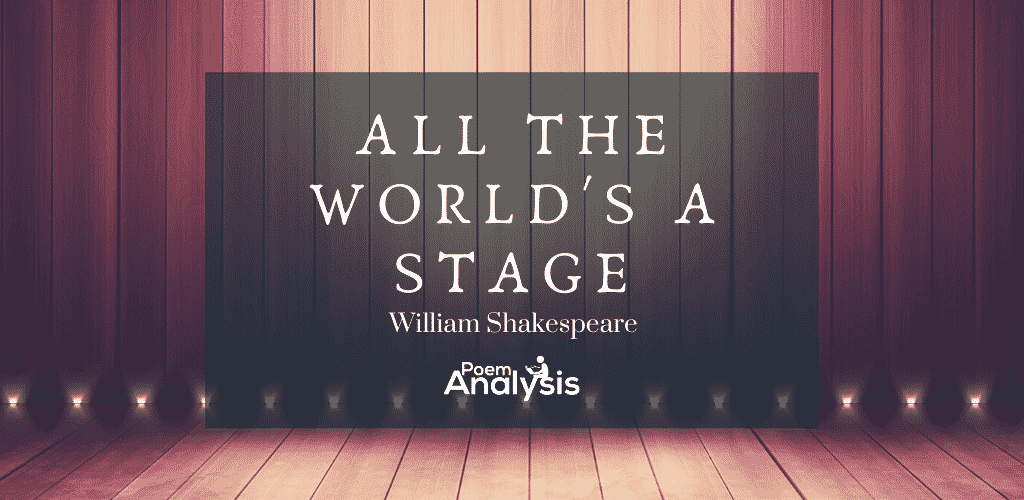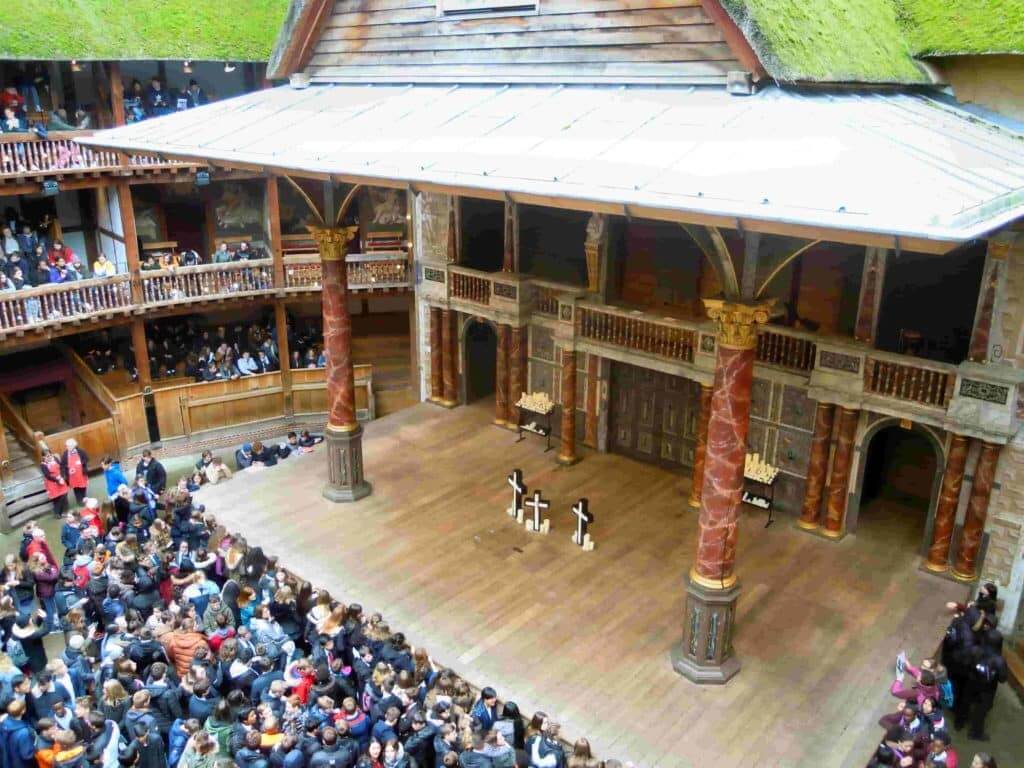The famous speech ‘All the world’s a stage’ was first published as part of As You Like It in the First Folio in 1623. Scholars are unsure when the play was performed for the first time but it was likely sometime around 1603. The play is a five-act pastoral comedy that features a monologue in which Jacques considers the nature of the world, the roles men and women play, and how one ages, being “All the world’s a stage”.
All the world’s a stage (from As You Like It, spoken by Jaques to Duke Senior) William ShakespeareAll the world’s a stage, And all the men and women merely players; They have their exits and their entrances; And one man in his time plays many parts, His acts being seven ages. At first the infant, Mewling and puking in the nurse’s arms; And then the whining school-boy, with his satchel And shining morning face, creeping like snail Unwillingly to school. And then the lover, Sighing like furnace, with a woeful ballad Made to his mistress’ eyebrow. Then a soldier, Full of strange oaths, and bearded like the pard, Jealous in honour, sudden and quick in quarrel, Seeking the bubble reputation Even in the cannon’s mouth. And then the justice, In fair round belly with good capon lin’d, With eyes severe and beard of formal cut, Full of wise saws and modern instances; And so he plays his part. The sixth age shifts Into the lean and slipper’d pantaloon, With spectacles on nose and pouch on side; His youthful hose, well sav’d, a world too wide For his shrunk shank; and his big manly voice, Turning again toward childish treble, pipes And whistles in his sound. Last scene of all, That ends this strange eventful history, Is second childishness and mere oblivion; Sans teeth, sans eyes, sans taste, sans everything.

Summary
‘All the world’s a stage’ is a monologue of “the melancholy Jaques” from Act II Scene VII of the play As You Like It by William Shakespeare.
The speaker, Jacques, begins “All the world’s a stage” by asserting that life is like a stage on which “men and women merely” play roles. They play different parts throughout their lives, as the speaker is now. In the bulk of this monologue, the speaker spends time going through the seven ages of man. One starts in infancy, moves through childhood, and into the best part of their life when they’re a lover, soldier, and judge. Later, they lose control of their senses and eventually can’t take care of themselves.
You can read the full speech here with the analysis or watch Benedict Cumberbatch recite ‘All the world’s a stage’.
Meaning
Shakespeare uses the monologue in As You Like It to compare life to a stage on its most basic level. His speaker, Jacques, is suggesting that life is a stage, and men and women are players who take on different roles throughout their lives. The concept comes, in part, from medieval philosophy. The “seven ages” dates from the 12th century. There was a tapestry of King Henry V depicting the seven stages of man. For theological reasons, medieval philosophers constructed groups of seven as in the seven deadly sins. Therefore, it is believed that the “seven ages” derive from medieval philosophy.
Structure and Form
‘All the world’s a stage’ is an excerpt from William Shakespeare’s well-loved play, As You Like It. Specifically, it is a monologue that is spoken by the melancholy Jaques. The monologue is twenty-eight lines long and is in part written in blank verse, or unrhymed iambic pentameter (on average iambic pentameter). This means that the lines do not rhyme, but they do (at some points) contain five sets of two beats, the first of which is unstressed and the second of which is stressed.
It is also important to consider how a performer might’ve used the stage to their advantage when performing these lines and the impact that formal elements like enjambment and alliteration would’ve had on the audience’s understanding of the speech.
Literary Devices
Shakespeare makes use of several literary devices in this speech. Some are:
- Simile: ‘creeping like a snail”; “soldier… bearded like the pard”; etc.
- Metaphor: The entire speech itself is more like symbolism; men and women are portrayed as players whereas life is portrayed as the stage. Shakespeare uses the “stage” as an extended metaphor.
- Repetition: Another figure of speech used in this monologue; words like sans, age, etc. are repeated for the sake of emphasis.
- Anaphora: It is used in the eighth and ninth lines, beginning with the word “And”.
- Synecdoche: “Made to his mistress’ eyebrow”; “And then the justice”; etc.
- Alliteration: “his shrunk shank”; “quick in quarrel”; etc.
- Onomatopoeia: “pipes / And whistles in his sound”
- Asyndeton: “Sans teeth, sans eyes, sans taste, sans everything.”
The Seven Ages of Man
The seven stages of life, as described by Jacques in ‘All the world’s a stage’ are:

- Infancy (lines 5-6): The first stage of man’s life is infantry. In the monologue, readers can find an image of a baby crying softly and throwing up in the caregiver’s lap.
- Boyhood (lines 7-9): The image of a school-going boy unwilling to go to school describes this stage.
- Adolescence/Teenage (lines 9-11): In this stage, Shakespeare presents an image of a dejected lover who composes sad songs for his beloved.
- Youth (lines 11-15): He projects the stage of youth by depicting the life of a soldier. As a soldier, a person in his youths is unafraid of dire challenges.
- Middle Age (lines 15-19): The fifth stage deals with middle age and it is described by the picture of a judge or one who practices law. In this stage of life, one starts to mature and becomes wiser than before.
- Old Age (lines 19-25): Just before the final stage, comes old age, turning the manly voice of youth into the childish trebles and whistling. It makes the body weak and the mind, dependent upon others.
- Death (lines 25-28): In the finale of this seven-act-play of life, the strange and eventful history ends abruptly. It leaves a man with nothing.
Detailed Analysis
Lines 1-6
All the world’s a stage,
And all the men and women merely players;
They have their exits and their entrances,
And one man in his time plays many parts,
His acts being seven ages. At first, the infant,
Mewling and puking in the nurse’s arms.
In the first lines of ‘All the world’s a stage,’ the speaker, Jacques, begins with the famed lines that later came to denote this entire speech. He declares that “All the world’s a stage” and that the people living in it are “merely players.”
This sets up what is one of the most skilled conceits in all of English literature. Every person, no matter who they are, where they were born, or what they want to do with their lives, wakes up every day with a role. They enter, they exit, just like performers.
It’s important to note at this point that these lines would be read on stage in front of an audience. The extended metaphor would not be lost on anyone listening or watching. The actor is declaring to the audience that “you” are just as much of an actor as he is.
Before the listener starts to get concerned about the role they have to play, Jacques adds that a “man,” (or woman) plays many different parts in their lives, as an actor does. Whoever the actor may be on stage is not only “Jacques” he’s also many other characters throughout his career. It’s in the fifth line of the monologue that Shakespeare brings in a slightly more complex concept, that of the “seven ages” of humankind. The first of these is the “infant”.
Lines 7-18
And then the whining schoolboy, with his satchel
And shining morning face, creeping like snail
Unwillingly to school. And then the lover,
Sighing like furnace, with a woeful ballad
Made to his mistress’ eyebrow. Then a soldier,
Full of strange oaths and bearded like the pard,
Jealous in honour, sudden and quick in quarrel,
Seeking the bubble reputation
Even in the cannon’s mouth. And then the justice,
In fair round belly with good capon lined,
With eyes severe and beard of formal cut,
Full of wise saws and modern instances;
As the speech progresses, Jacque continues to describe how someone ages, the roles they play, and what everyone is like, generally, at different times in their lives. One will at some point be a “whining school-boy” and a “lover / Sighing like furnace.” There will be sorrows, ballads, and losses. One will become “a soldier” and take oaths of allegiance while seeking out a fight. This is one of the more difficult stages in one’s life and if drafted, not one that someone could ignore.
The man’s youth has given way to a full beard like a “pard,” or leopard. In these lines, there is also an interesting metaphor comparing a human or animal blowing a bubble with its mouth to staring down a cannon that might fire at any moment. Finally, this metaphorical person becomes “the justice,” or magistrate, someone with a steadier knowledge of what’s right and wrong. They have “Wise saws,” or wise sayings and “modern instances,” or arguments for legal cases.
Lines 19-28
And so he plays his part. The sixth age shifts
Into the lean and slippered pantaloon,
With spectacles on nose and pouch on side;
His youthful hose, well saved, a world too wide
For his shrunk shank, and his big manly voice,
Turning again toward childish treble, pipes
And whistles in his sound. Last scene of all,
That ends this strange eventful history,
Is second childishness and mere oblivion,
Sans teeth, sans eyes, sans taste, sans everything.
In the sixth stage of man’s life, he moves into the “pantaloon” or comfortable clothes worn by old men. His youthful clothes are too loose because he’s lost weight with age. He’s also lost his deep voice. It reverted back to something that’s closer to what he had in one of the earlier stages of his life.
The last stage of a man’s life is his “second childishness and mere oblivion.” This is when he loses control of everything that made him an adult. Now, he’s helpless and dependent on others, as he was when he was a child. He is “sans,” or without, “taste,” “eyes,” and “teeth.” The final image is the man without “everything.” His life, all its intricate memories, and details are lost.
Themes
In ‘All the world’s a stage’ Shakespeare discusses the futility of humanity’s place in the world. He explores themes of time, aging, memory, and the purpose of life. Through the monologue’s central conceit, that everyone is simply a player in a larger game that they have no control over, he brings the themes together. Shakespeare takes the reader through the stages of life, starting with infancy and childhood and ending up with an old man who’s been a lover, a soldier, and a judge. The “man” dies after reverting back to a state that’s close to childhood and infancy. You can also explore the themes in other William Shakespeare poems.
Tone and Mood
In ‘All the world’s a stage’ Shakespeare creates a somber and depressing mood through the simple breakdown of life, success, love, and death. The beauties of life are compiled into a short monologue that’s over almost as soon as it began. With this, the reader is left to consider their own life and what “stage” they’re in now. The speaker knows that this is the way the world is, everyone listening to his words is all going to end up back where they started as children and there’s no way to change that fact.
Historical Context
In Shakespeare’s comedy As You Like It, Rosalind and Celia encounter some memorable characters in the Forest of Arden. Jaques, the melancholy traveler, is the most notable of them all. He speaks many famous speeches such as “too much of a good thing”, “A fool! A fool! I met a fool in the forest”, and “All the world’s a stage”.
Jaques’ monologue is an echo of the motto of the new Globe Theatre which was opened in the summer of 1599. The motto was “Totus mundus agit histrionem”, meaning “all the Globe’s a stage”. The play was written in the same year.
In his book “William Shakspere’s Small Latine and Lesse Greeke”, T. W. Baldwin states that Shakespeare’s version of the monologue is based upon Palingenius’ “Zodiacus Vitae”. Shakespeare would have studied this school text at the Stafford Grammar School. The text also presents stages of a man’s lifespan. He would have taken inspiration from Ovid and Juvenal.
FAQs
In Act 2, Scene 7, Line 139 of William Shakespeare’s pastoral comedy As You Like It, the melancholy Jaques said the monologue ‘All the world’s a stage’.
The central theme of this monologue is life and its seven stages. Shakespeare describes the phases that are observed in a man’s lifespan.
According to Shakespeare, the “world” is like a “stage”. The stage remains permanent. Only the actors and actresses change with time. They have their parts to play. When the curtain slides down, they are no more. The stage becomes empty. It makes way for a new play, maybe the next day or the day after tomorrow. We, human beings, are like artists. We play our roles as someone’s child, lover, life partner, or grandparents during our lifespan. When our time comes, the sidewalk is our only destination leading us to the leaden death.
Through this monologue, Shakespeare gives the message of life’s impermanence. How quickly the play of our life ends and the strange eventful lays are concluded get featured in this speech.
The term, “second childishness” refers to the cognitive decline of an old person. It is characterized by childlike judgment and behavior. Shakespeare called the last stage of man’s life the “second childishness” for this reason.
The word “sans” is a preposition that is generally used in literary works. This word adds a flavor of humor to the line where it is used. Literally, it means “without” or “in the absence of something”. In this line, the use of palilogy (repetition of “sans”) puts emphasis on the nothingness in the last stage of a human’s life that is “mere oblivion”.
The lover’s sigh is compared to the exhausts of a furnace. A man in his youths is driven by the carnal desires that fuel his heart. It kindles the burning desire for love there. When the fire is blown out by the current of a lady’s rejection, the heart sighs like a furnace. The heat of passion is there but the fire of heartfelt emotions is extinguished.
Similar Poetry and Quotes
Readers who enjoyed the ‘All the world’s a stage’ monologue should also consider reading some of William Shakespeare’s 154 sonnets and poems from other writers. For example:
- ‘Sonnet 73′ – This sonnet is a part of the “Fair Youth” sequence. It speaks about aging and uses a pensive, introspective tone.
- ‘Sonnet 5’ – This poem depicts the passing of time and relates nature’s four seasons with life’s stages.
- ‘On Aging’ by Maya Angelou – It’s one of the best-known poems of Maya Angelou. This poem explores what it means to get old and the truth about age. Explore more Maya Angelou poems.
- ‘Auguries of Innocence’ by William Blake – It’s one of the best-loved poems of William Blake. This poem presents a series of paradoxical ideas revolving around the theme of innocence vs experience. Read more William Blake poems.
You can also consider reading about these psychologically probing speeches from Shakespearean plays.
- ‘Tomorrow, and tomorrow, and tomorrow’ monologue from Macbeth
- ‘To be, or not to be’ soliloquy from Hamlet
- ‘The quality of mercy is not strained’ monologue from The Merchant of Venice
You can also explore the greatest Shakespeare sonnets, and Shakespeare’s best love sonnets.





wait how’s physics related to this and how does biology affect our lives. i am confusion if u guys find an answer lmk lol clsdh of clsnd
I mean physics and biology affect pretty much everything! I got lost in your acronyms I’m afraid. I’m too old to understand!
Your reply really helped me out so much! I passed my science and english exam! 😄lol
I doubt we had much sway with the science! Either way congratulations. You must be ecstatic!
Can I have your discord uwu
40-year-old gamers don’t have discord; just a small friends list, large bags under their eyes, and a gamerscore bigger than their bank balance.
names of all seen stages?
Infancy, Schoolboy, Teenager, Young Man, Middle age, Old age, and Death.
You have made it easy to digest. Thanks very much
That’s what we do! Glad you approve.